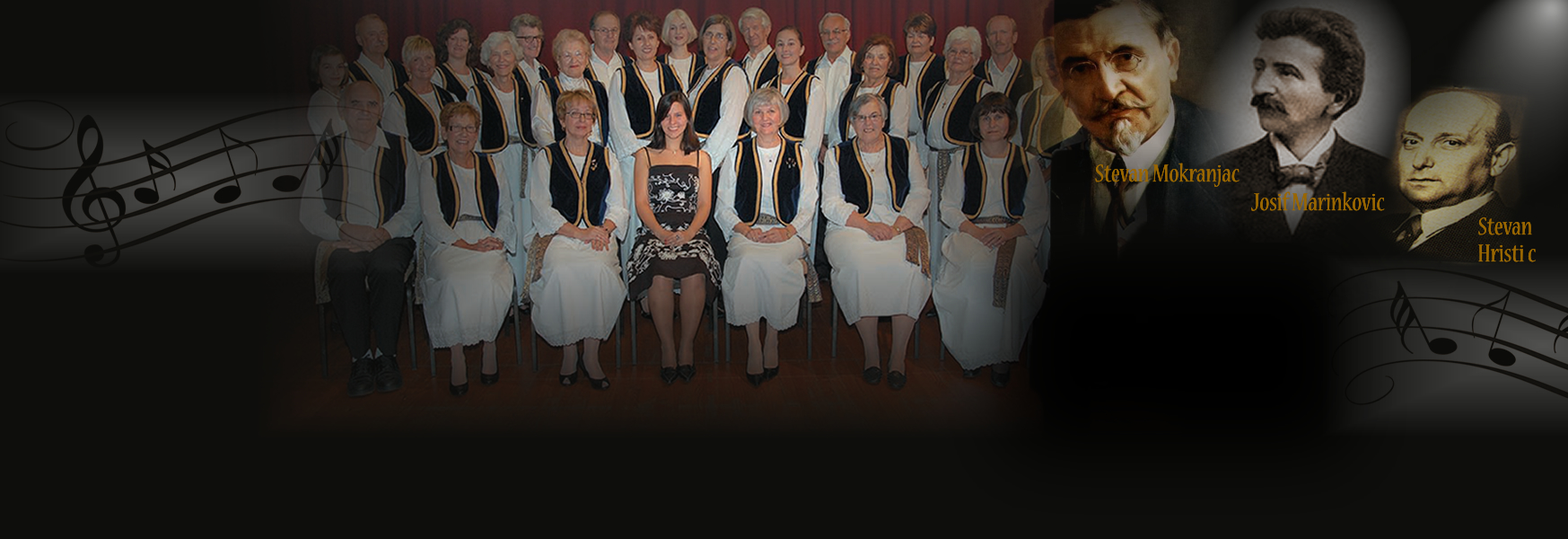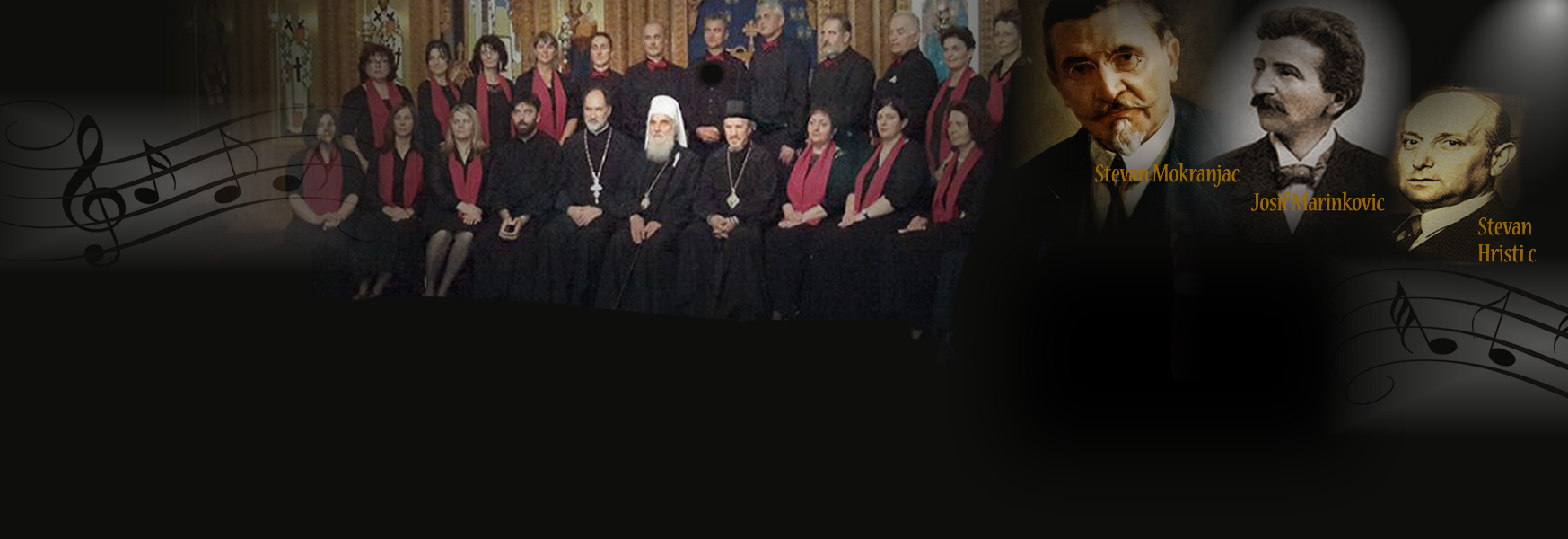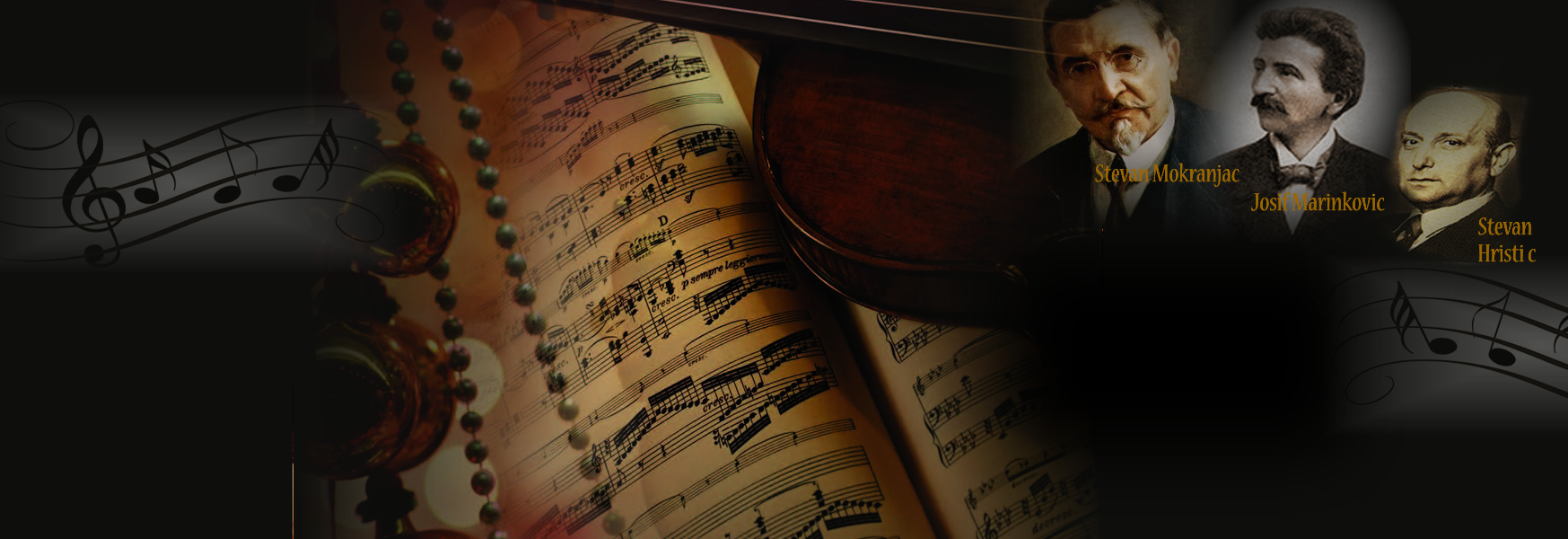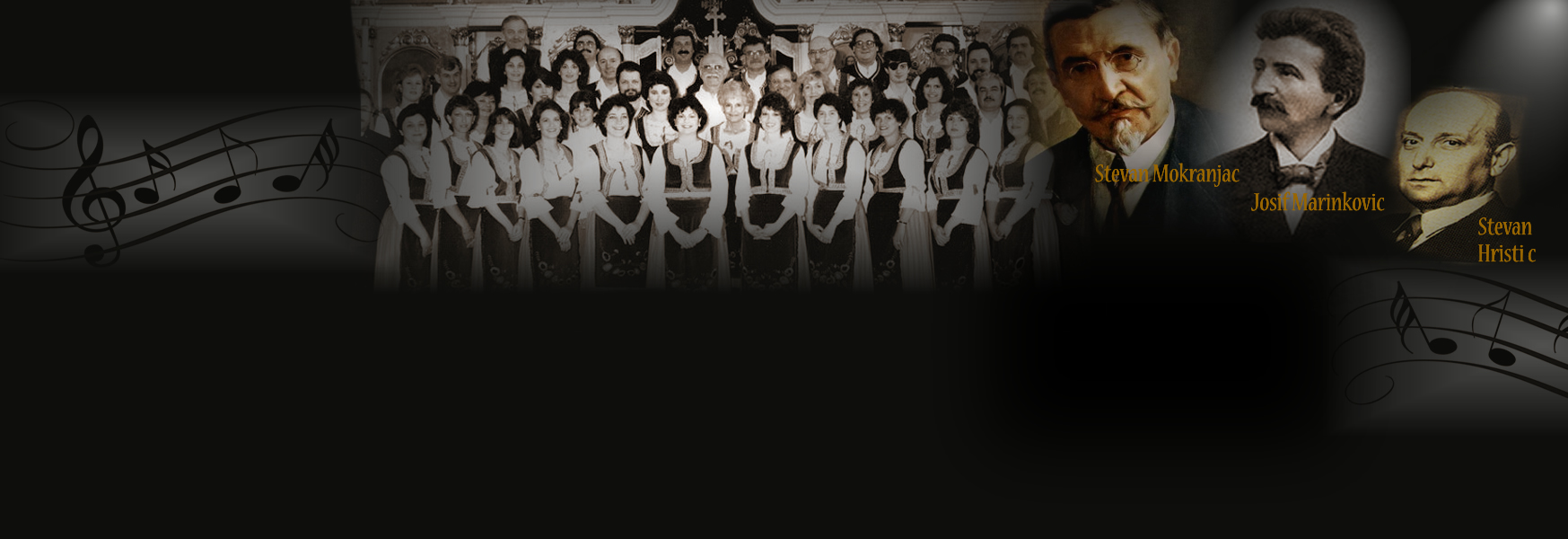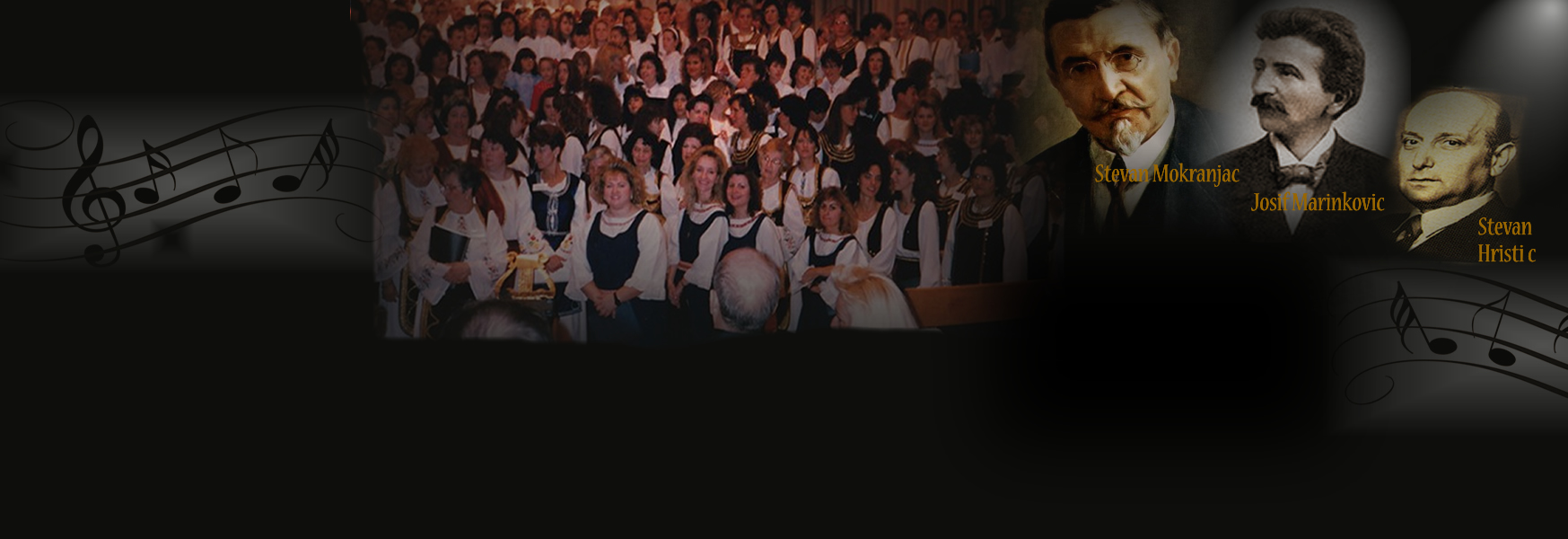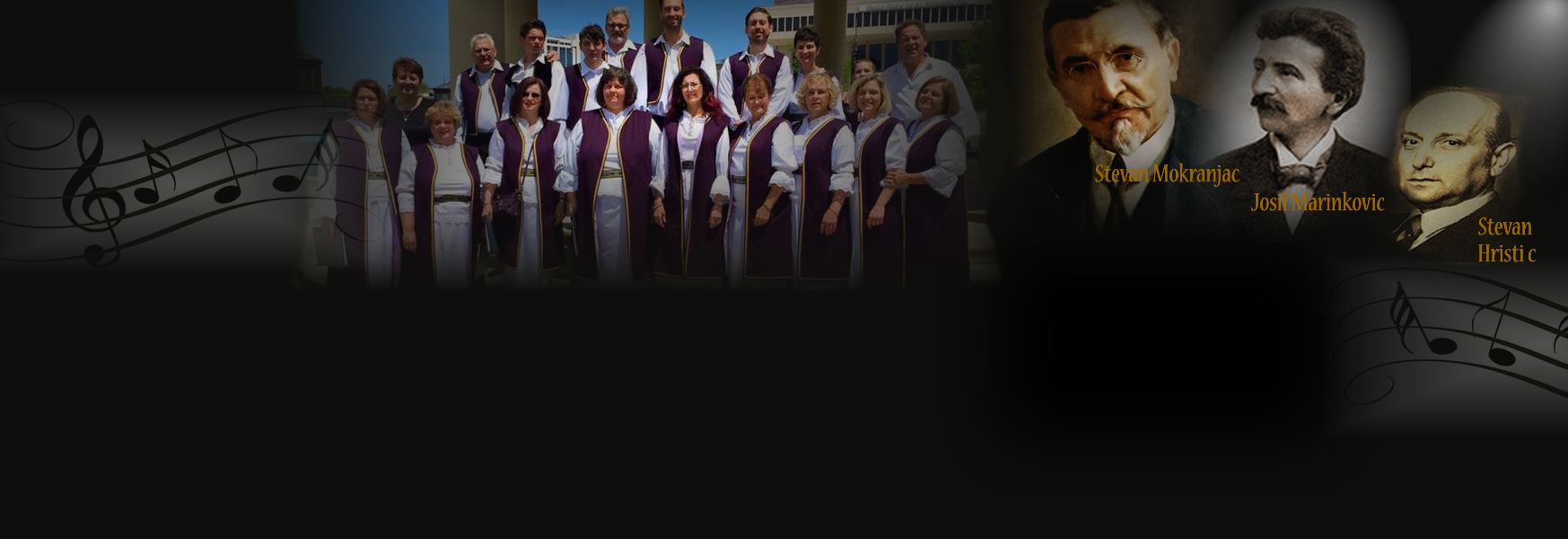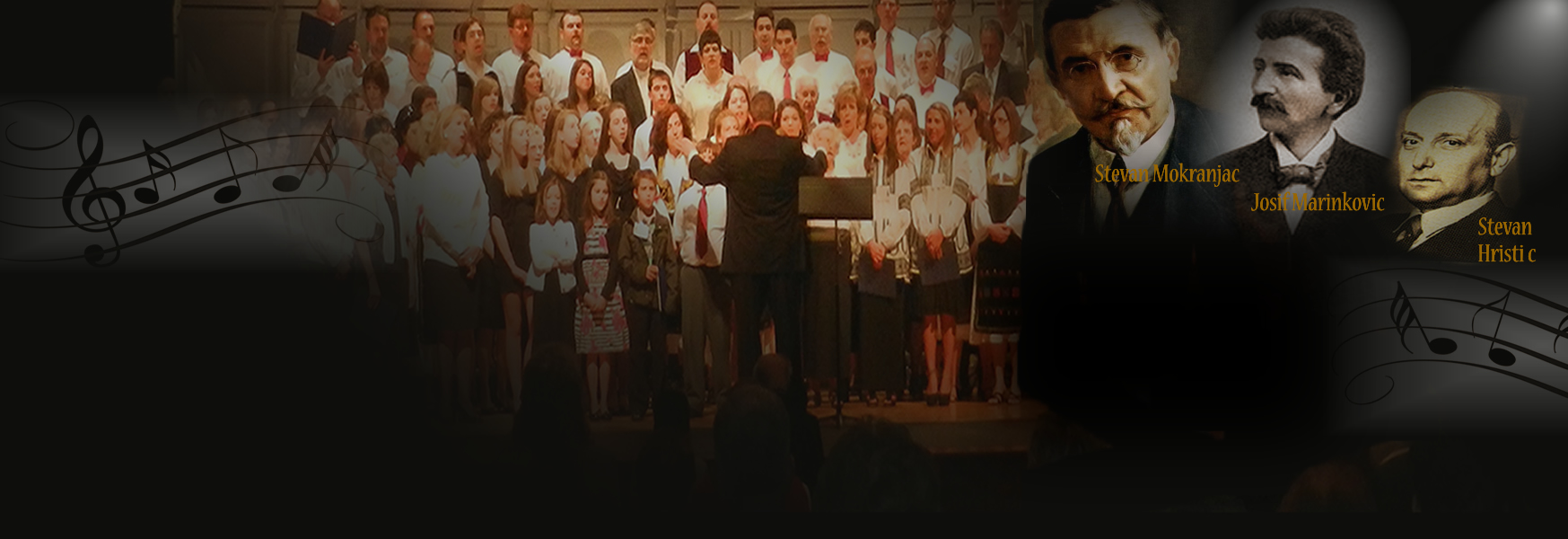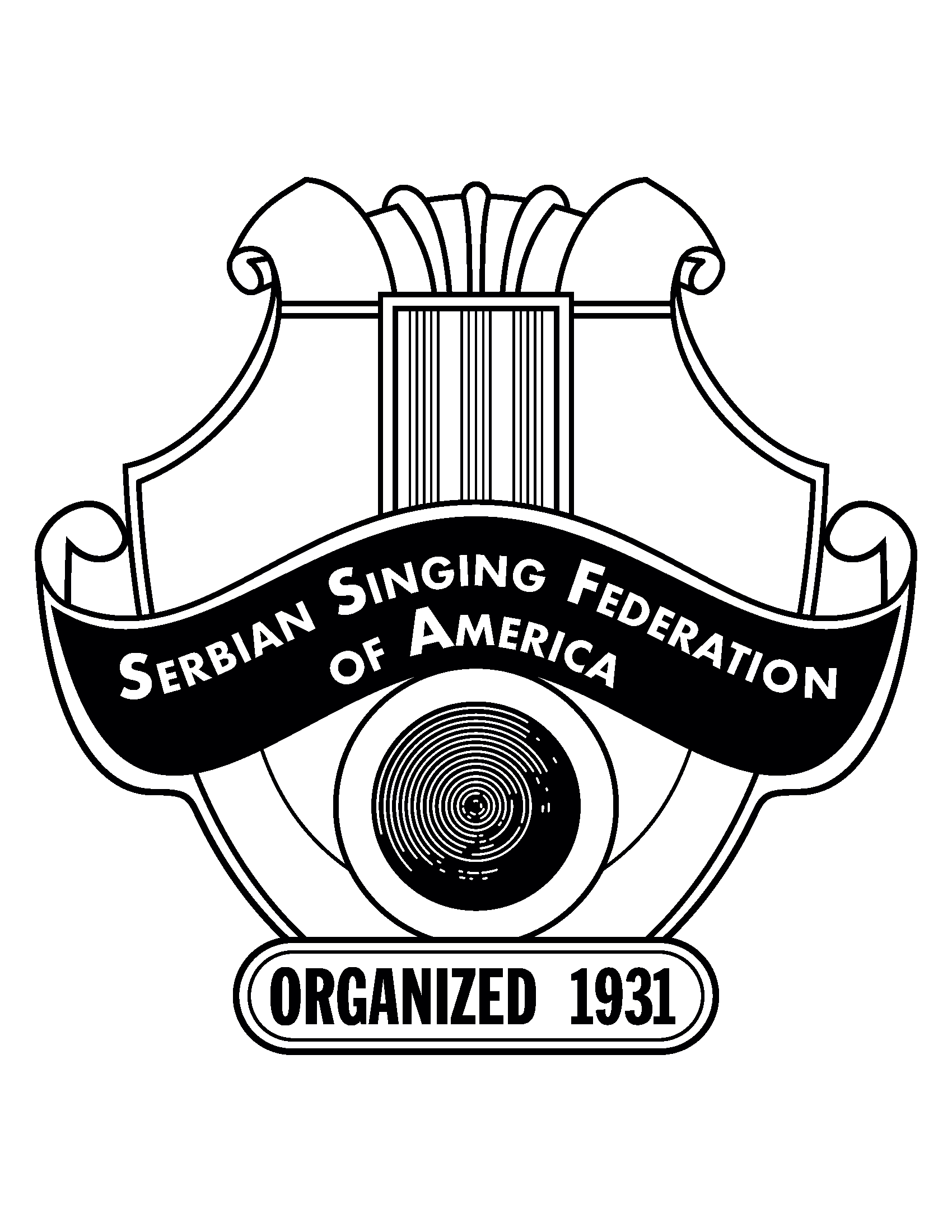History of the Serbian Singing Federation
Serbs began to immigrate to the United States towards the end of the nineteenth century. At first, it has been difficult for them to adjust to the new environment, but it gradually, as they grew in number they started to organize themselves locally.
 Early in the twentieth-century local choral groups sprung up throughout the country. Most of these did not last long for lack of music and communication with other Serbian groups. The oldest choral group on the North American continent, which is still flourishing, is the S.S.S. Branko Radichevich of Chicago, Illinois, which was founded in 1906.
Early in the twentieth-century local choral groups sprung up throughout the country. Most of these did not last long for lack of music and communication with other Serbian groups. The oldest choral group on the North American continent, which is still flourishing, is the S.S.S. Branko Radichevich of Chicago, Illinois, which was founded in 1906.
When the local organizations became more numerous, they organize federations. Thus, several beneficial associations came into existence, later the Serbian Orthodox diocese.
 The idea of federating the choral societies was entertained for some time before it was realized. The credit of founding the Serbian Singing Federation goes to Vladimír (Vlajko) M. Lugonja. Armed with the insight that no choir can exist long by itself, Vlajko persisted in his efforts to organize a national federation of choirs.
The idea of federating the choral societies was entertained for some time before it was realized. The credit of founding the Serbian Singing Federation goes to Vladimír (Vlajko) M. Lugonja. Armed with the insight that no choir can exist long by itself, Vlajko persisted in his efforts to organize a national federation of choirs.
In 1930, he wrote a series of twelve articles in the “Srbobran,” conferred with leaders of many local choral groups, spoke at banquets and succeeded to arouse the interest for a national singing Federation.
Vlajko was greatly encouraged by the responses to his articles on called a conference for March 1931 to discuss the need for and the organization of a national Serbian choral organization. Delegates from the then existing choirs heard reports, discussed the issues and decided to call a convention to formalize the organization, elect officers, and proceed to bring about the movement which grew from the founding five to the present forty-one choirs throughout the United States and Canada.
The first convention of the Serbian Singing Federation was held in October 1931 consisting of representatives from five singing societies - Chicago – Branko Radichevich; South Chicago – “Sloboda”; Gary – “Karageorge”; Detroit, “Ravanica”; and Youngstown, “Vojvoda Putnik” who became the original five charter member choirs. It was this first convention that laid the foundation of the Serbian Singing Federation and set its direction for future expansion and growth. Elected as the first officers of the Serbian Singing Federation were: Petar Keulovich (Gar), President; Milica Stanizan (Chicago), Vice-President; Bozo Cucujlevich (South Chicago), Vice-President; Vladimir M. Lugonja (Detroit), Secretary; Pajo Perencevich (Youngstown), Assistant Secretary; Nada Sulich (Chicago), Financial Secretary; and Stevo Bogdanovich (Chicago), Treasurer. Both the March 1931 Conference and the October 1931 Convention were held in the Christopher House in Chicago, and the SSF headquarters until 1936 was in the city of Highland Park, a suburb of Detroit, Michigan.
New choirs were organized, old ones reactivated, and following a long series of articles in the American Srbobran (publication of the Serb National Federation, Pittsburgh, PA), a national choral festival was called for May 1936 on Memorial Day weekend in Akron, Ohio. Sixteen choirs responded to this first festival. Thousands of visiting Serbs, including 1,000 from members of the Serbian choral societies, flocked to Akron to participate and enjoy the SSF’s First Choral Festival! The then Royal Yugoslav Government was approached by a quartet of famous young singers, the Maksimovich Brothers, and they were given traveling expenses to appear at the First Festival. The city of Akron decorated the streets and a huge “Welcome Serbian Singers” sign lined its Main Street. The hotels were so overcrowded that some singers were housed in the police station and others in a hospital.
In the early organizational days of the SSF, member choirs were divided into two divisions: East and west, and generally into three categories: mixed male and female. Festivals were held every two years and were of competitive nature.
Three of the most qualified paid, professional judges in the hosting city were contracted to choose the best singing choir using an arithmetical rating system. One of the judges was Serbian or some other Slavic descent, acting as a guide on proper diction, style, and interpretation, while the other two handled the more technical aspects of the compositions.
It was an exciting area for choirs and audiences reaped the sounds of the finest in Serbian choral compositions. The competitive festivals kept the choirs up at the top of their strength, numerically and musically; inspired them to attend rehearsals; cooperated; plan for the future and consider their seeing more seriously. They brought out the best efforts on the part of the directors, some of which needed the little stimulant only a competitive festival can bring forth.
It was that something ”extra” which old-timers will remember from past festivals. From the point of audience appeal, the competitive festivals drew much more because of the interest people naturally have in the contest between young groups for excellence in their chosen field of musical art.
Searching for appropriate awards to be made to contest winners, SSF secretary, Vlajko Lugonja, prevailed upon Mrs. Barbara Pupin Smith to donate a silver cup in memory of her father, inventor +Mihajlo Pupin who was a lover of choral singing and an admirer of the SSF movement. The first prize gained possession of the coveted Michael Pupin Memorial cup, a masterpiece of hand wrought English sterling silver valued at the time at $1,500. The male choirs competed for the Nikola Perazich Cup and the girls’ choirs for a cup donation by the Serbian Womens’ Organizations.
The “Pupin Cup” quickly became the envied symbol that all choirs strived to obtain. Professor Alexander Savine, the internationally famous composer and choral director, whose able inpatient tutoring of the younger generation of singers of “Branko Radichevich” brought this group to the foreground of Chicagoland singing choirs that one them the highest honors, winning the SSF National Championship both in the 1936 to 1938 festivals.
In the third festival, after being proclaimed the western winner, their disappointment was keenly felt by the singers and entire community when following an arithmetical error buy one of the judges, the Gary “Karageorge Choir” was selected to represent the west in the finals. It was Cleveland’s “Njegosh Choir” that won the National Championship in 1940 and the right to the “Pupin Cup” for a year.
The SSF wisely discontinued competitive festivals because many singers went away disappointed. It was decided to “sing for the glory of God and the honor of our people,” believing that if a choir of 30-40 singers was able to make a 300-400 mile trip, that was award enough.
The famed “Pupin Cup” can be seen at the SSF Headquarters in Madison Heights, Michigan where singers can recall and view an archive of the “silver era” of SSF singing.
During the Second World War, choral activities were greatly reduced. Many choirs became temporarily inactive and the membership of the SSF fell from nearly thirty to only eleven. During the war years, there were no festivals and only one convention. During this period singers assisted SSF Secretary, Vlajko Lugonja in the shipment of thousands of parcels of clothes and food to war refugees. After the War, the SSF regained its former membership.
In 1948, the SSF sponsored its first post-war festival in Pittsburgh, Pennsylvania. A great moral success, the festival drew nineteen participating choirs and thousands of Serbs from throughout the nation. Hosts for the occasion where the seven Serbian choirs from the Pittsburgh area - Aliquippa, Clairton, Midland, Pittsburgh, Wilmerding, Youngwood, and McKeesport-Duquesne.
Festivals got underway Saturday evening with dances at the Slovak Hall in McKeesport and the CIO Hall in Aliquippa. The highlight of the evening was the selection of a “Princess of Sevdah” by Vinka Ellesin – “Queen” of Sevdah singing.
The following morning visiting choirs sang responses in the church at six of the Pittsburgh area parishes.
The Sunday afternoon concert at the Soldiers and Sailors’ Memorial Hall featured performances from nine member choirs. Special program soloist was Serbian baritone opera star, Millan Petrovich, who sang several classical compositions in addition to solos with the Gary “Karageorge” and Steubenville “Petar Krstich” choirs. Two dances Sunday evening brought singers together - one at the Slovak Hall in McKeesport and the other at the Serbian Hall in Midland.
After a morning of sightseeing, choral societies presented their second program Monday afternoon in the renowned Carnegie Music Hall. Special festival soloist was the famous Serbian-born opera star, Daniza Ilitsch, who was, at the time, singing with the Metropolitan Opera. Her solo in Bajich’s beautiful and lyrical lullaby “Uspavanka Mome Sinu Vladimiru” with the Aliquippa girls’ choir market as most spectacular and memorable performance. Every note of the festival was recorded by the U.S. State Department and eight songs were selected for broadcasting over the “Voice of America” and BBC to Yugoslavia and other countries behind the Iron Curtain.
The decades following the war saw the continued success and prosperity of the SSF in perpetuating Serbian music on the North American continent. Players continued to organize, and newly formed ones eagerly joined the national singing federation.
Festival participation has continued to remain strong and has become one of the foremost national Serbian events held each year. Annual singing festivals have become “the” musical event of the year and have gathered thousands of Serbs each Memorial Day weekend for a gala event and rewarding musical experience.
The greatest honor that came to a Serbian artist is to be the soloist of a national choral Festival. To be picked to sing to and for the singers is the most coveted engagement - a veritable command performance - of which any singer should be proud. The SSF over the years has been blessed with the appearances of many fine soloists at festivals. Their sacrifice of time and willingness to perform have offered a special touch of class to SSF Festivals. What would festivals have been without hearing: Vinka Ellesin; Milan Timotich; Sophia Topalsky Papich; Rasha Radenkovich; Uros Seferovich; Mija Novich; Angelina Vlajkovich; Mitar Bulatovich; Helen Tomich; Danica Chirich; Militza Kosanchich; Milutin Lazich; Paul Zelich!
The tradition of choir concerts has continued to remain a stronghold within the SSF. Choirs annually sponsor a concert inviting another distant SSF member choir to be their weekend guests. It is here that the Serbian hospitality, music, and song are united to establish life-long friendships among singers. Choir anticipates with great enthusiasm the invitation to be the guest of another member choir.
Most important to the success of any choir, is its choir director. Recognizing the fact that the directors of all member choirs are important, a history of the SSF would not be complete without naming those who have achieved and contributed to the national SSF scene, namely: Adam N. Popovich; Slobodan Zelich; Nada Milosevich; Nikola Resanovic; V. Rev. Milan Markovina; and the late Alexander Savine, +Boris Dobrovolsky, +V. Rev. Sava Vujkov, +V. Rev. Dr. Milan G. Popvoich, and +Peter Bila. In addition to the supreme directing talents of these choral directors, and most importantly, each has functioned as a composer and provided many choral compositions for our member choirs.
America’s Bicentennial did not go by unnoticed, as choirs from coast to coast participated in Bicentennial concerts. Of notable accomplishment in the Midwest was the Milwaukee “SSS Stevan Sijacki” and South Chicago “SSS Sloboda” who combined in a musical extravaganza to perform Ljubomir Bosnjakovich’s cantata “Albanska Golgota,” among other compositions. The Milwaukee Symphony Orchestra and Chicago Civic Orchestra cooperated in providing orchestral accompaniment to the two concert programs. In the East, the “Petar Krstich Serbian Choir” of Steubenville, Ohio likewise celebrated a Bicentennial with a grand performance of the “Albanska Golgota.”
The SSF returned to the city of Akron, Ohio for the Bicentennial Festival which drew a record number of choirs, participants and spectators. The Stevan Hristich Serbian Choir of Phoenix, Arizona sacrificed over $8,000 to make the trip to Akron and accept the SSF’s invitation to be that coveted Honored Church Choir for the festival and the first Western choir to appear at the SSF festival.
Saturday’s concert was held in the new and modern St. Archangel Michael Serbian Hall, while Sunday’s concert was held in the beautiful and spacious Performing Arts Building of the University of Akron. Mrs. Sophia Papich, festival Guest Soloist entertained concertgoers at the Sunday performance in her special style that has acclaimed her among the best of Serbian soloists. The festival “piece de resistance” was the rendering of Bosnjakovich’s “Albanska Golgota” by the Petar Krstich Serbian Choir of Steubenville, Ohio.
As the nation paid tribute to its founding father, the Serbian Singing Federation likewise honored its founder, V.M. Lugonja. A gala, grand testimonial sponsored by the S.S.S. Ravanica was held in Vlajko’s honor at the posh Hillcrest Country Club in suburban Detroit, where singers gathered from many choirs and colonies to pay tribute to their founder. Special guests/speakers included: Rt. Rev. Dr. Bishop Firmilian; Toastmaster Bill Salatich; SSF Vice-President Kosta Papich; SSF Executive Secretary, Paul S. Bielich; SNF President, Robert Rade Stone; Midwest Diocese Vice-President, Dmeter Rakich, Ravanica Church President, Lazo Price; Ravanica Choir President, Milan Chonich; Host colony paster Rev. Varnava Minich; and Walter Vukovich.
Although the Federation cooperates with a Serbian Orthodox Church on a national basis and all of our churches on the local level, the SSF is a separate, nonprofit organization, founded for the purpose of organizing, developing and coordinating the efforts of its member choirs through festivals, conventions, choral workshops, scholarship funds and recordings. The primary responsibility of each member choir is to sing responses to the Divine Liturgy every Sunday in their local churches. Through its choirs, the SSF seeks to perpetuate among Americans and Canadians of Serbian descent, the priceless cultural heritage of their church and secular music.
The Serb National Federation has always been and continues to remain the Greatest Benefactor to the Serbian Singing Federation. Their monthly stipend, in addition to their generosity and publishing the SSF and its member choirs in the “American Srbobran” has enabled the SSF to continue to prosper and grow.
SSF representatives attend every Church Sabor (religious meeting usually held every three years) and the national conventions of other Serbian organizations.
Annual conventions and festivals are held, alternating from east to west, the conventions in September and the festivals in May.
This Serbian Singing Federation publishes a quarterly newsletter, the “SSF HI-NOTES,” to keep individual singers informed and other member choirs and the SSF itself. The news publication has been fortunate over the years to have been in charge of very capable and talented editors, namely: Danica Buncich Wess; Nikola Borota; and Rose Kosanovich.
Every effort is being made to incorporate more religious education into the Federation. The first concrete attempt has been at the national conventions, or a noted religious educator or other informed people of Serbianism and Orthodoxy is given the keynote spot.
Certain our future lies with our junior choirs, we use every opportunity to encourage the formation of these groups and training of new directors with the annual SSF Choral Workshop. Started in 1968, the Choral Workshop has attracted a good cross-section of directors, both student, and present directors, in a three-day workshop/seminar where directing techniques, styles and musical knowledge are exchanged and shared.
Each choir is permitted two delegates to represent it at the annual convention. These delegates must be eighteen years of age or older and must have been active singing members for at least six months prior to the convention date. The choir’s SSF dues must be paid through August of that gear to be considered a choir in good standing.
Bids for convention festival weekends for the following year are excepted at this time, reports are heard, pledges for scholarship funds are accepted and plans for the future are discussed and advanced. New offices are elected for the following year.
The greatest wealth of the Serbian Singing Federation is in its Library, comprising the works of 96 Serbian composers with thousands of musical scores. It has been said that the Federation Library is more complete than any Serbian music collection in the world.
The publishing of Serbian choral compositions is an important aspect of the Serbian Singing Federation. Close to 200 compositions have been published which are furnished gratis two member choirs. A “Music Publishing Committee” guides the publication of new musical scores. Publication costs are often defrayed by donations from individuals and/or organizations who contribute toward the publication of a musical composition. Although many individuals have lent assistance in the necessary prepublication tasks, Dragie Cucujlevich Zuzuly of South Chicago and V. Rev. Milan Markovina of Milwaukee, Wisconsin deserves special recognition and tribute. Their time, efforts, and talents are responsible for a great many of the SSF publications.
The Serbian Singing Federation is eternally grateful to Dragie Cucujlevich Zuzuly, son of SSS Vice-President, the late Bozo Cucujlevich, for providing the SSF in 1950 with a composite book of responses to the Divine Liturgy. This much-needed LIturgy was deemed easy enough for the average choir, yet contained some compositions for the more advanced choirs who like to change their responses from time to time. Dragie embarked upon a venture – a labor of love - which took much of his spare time for nearly two years to complete. He made the selections, copied all the notes and texts and crowded as much into the 64 pages as the space permitted. Affectionately referred to as the “green book,” by singers, this composite liturgy is still in use and demand by many choirs today and necessitated a reprinting in recent years. The cost of printing this original work was defrayed by the proceeds of three illustrated lectures: “Serbian Holy Places,” given by the late Rt. Rev. Bishop Dr. Nikolai, exiled Bishop of Zhitcha, Serbia. We are also grateful to the sponsoring choirs, SSS Branko Radichevich of Chicago, Illinois and SSS Njegosh of Cleveland, Ohio for their efforts in making these events the success they were spiritually and materially.
The greatest stride forward for the SSF during the last decade was the purchase of a permanent Headquarters and Library in Madison Heights, Michigan, a suburb of Detroit. Purchased under the presidency of Mileva Ruvarac for $82,000 the SSF moved into its new Headquarters on November 30, 1984. Choirs and Serbs throughout the United States and Canada rallied behind the SSF national fund-raising campaign to solicit donations to defray the mortgage cost of the Headquarters building. Mr. & Mrs. William C. Tyirin of Cincinnati, Ohio became the greatest benefactors of the Serbian Singing Federation with their super generous donation. In the short period of two years, the SSF collected the necessary funds needed to pay off the mortgage and under the presidency of Dr. Richard N. Goich the Headquarters building was paid off. The Gala Mortgage Burning Banquet celebrated this great accomplishment.
An ongoing fund-raising campaign solicits funds for the purpose of adding to the Library everything available - published, copied or photocopied in Serbian music in the last century. Choral music, books on history, drama, poetry and other cultural subjects for the enjoyment, preservation and perpetuation of our Serbian Heritage and song in all its various forms will be available for all who can make use of it, in addition to our member choirs and the fast emergent tamburitza and kolo groups throughout the United States and Canada.
The Serbian singing Federation Headquarters and Library are located at 26356 John R Road, Madison Heights, Michigan and is administered by SSF Executive Secretary, Paul S. Bielich. Visitors to the Detroit area are encouraged and welcome to stop in and visit.
The sacrifices of many have collectively brought the birth of the Serbian Singing Federation and its growth and prosperity over the past sixty-five years. Our common interest to uphold and to keep alive here in America and Canada, the beautiful and nostalgic Serbian songs, is a bond of fraternal kinship which we cherish. Our common endeavor to leave a heritage of songs to the future generations is our aim, and may those who take up where we leave off find the spiritual inspirations and musical happiness that we have with our member choirs. “Pesma nas je odrzala, njozi hvala.”
